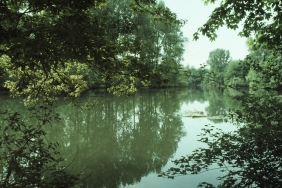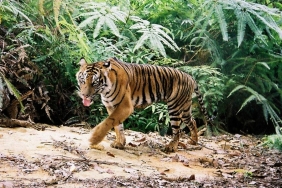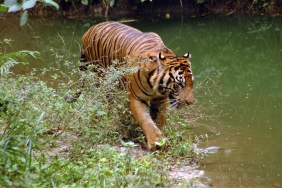WWF, SAMOSIR DISTRICT GOVERNMENT AND BANK MESTIKA REFOREST SAMOSIR EARTH PARK, TOBA
Samosir, North Sumatra (19/10) - As the largest volcanic lake in Southeast Asia, the Lake Toba region holds a myriad of invaluable potential. One of them is the Samosir Botanical Garden area - located on Samosir Island - which has an ecological function as a source of clean water for the surrounding community. But unfortunately, the last condition of the Samosir Botanical Garden forest cover is decreasing so that it becomes critical land. Even though the area is included in a protected area through Presidential Instruction No. 3 of 2009.
In an effort to restore the ecosystem function and water management in Samosir Botanical Garden, WWF-Indonesia collaborates with a local bank partner in Medan, Bank Mestika, together with the Samosir Regency Government to reforest Samosir Botanical Garden through the NEWtrees program initiative. NEWtrees is a tree planting program that provides a new discourse for the community to help the reforestation process and protect protected areas / forest areas and monitor the growth of trees through Geotags (labeling trees with latitude and longitude / precise location coordinates).
In its implementation, the NEWtrees program not only covers aspects of environmental conservation, but also goes hand in hand with a program to increase the socio-economic capacity of the community. Starting from program planning, seedling preparation, planting, monitoring and management activities. The choice of tree species planted also provides not only ecological benefits but also economic benefits for the surrounding community.
WWF-Indonesia Marketing Director, Devy Suradji, said "The NEWtrees activity is one of the solutions for anyone and anywhere who wants to participate in preserving the forest, because the trees planted can be monitored directly via the Internet with Geotag technology". Devy continued, "Through this NEWtrees program, corporations can participate in line with WWF-Indonesia's vision and mission to restore the function of forests and water catchments", she added.
The issue of forest sustainability encouraged Samosir Regency to develop a tripartite partnership model in a scheme with corporations and conservation organizations. "The increasing number of corporate efforts that are responsive to natural resource management through social responsibility programs is a fundamentally important point. The reforestation of Samosir Botanical Garden is the first step to make a bigger change in the future, which we hope can strengthen the joint commitment between WWF-Indonesia and partners to make this earth better through conservation efforts," said Mangindar Simbolon, Regent of Samosir Regency.
"Concerns about environmental degradation as well as love for Sumatra's nature in particular, encouraged the Board of Directors and Employees of Bank Mestika Dharma to look for ways to actively participate and contribute in repairing the damaged forests around Lake Toba and Samosir Island", said President Director of PT Bank Mestika Dharma, Achmad S. Kartasasmita. "We also hope that through this NEWtrees program, we can improve the sustainability of Samosir Botanical Garden while attracting tourists to come and thus provide economic benefits to the local community", he added.
WWF-Indonesia's collaboration through the NEWtrees initiative together with partners from 2008 to 2013 has reforested around 1365.5 hectares of areas including in Sebangau National Park, Central Kalimantan; Sebangau National Park, Central Kalimantan; and Sebangau National Park, Central Kalimantan. Sebangau, Central Kalimantan; TN. Rinjani, Lombok; Das Ciliwung, West Java; TN. Bukit Barisan Selatan, Lampung; TN. Ujung Kulon, Banten and Aceh with a total of more than 550,000 trees that have been planted.
Further information, please contact:
Dudi Rufendi, NEWtrees Coordinator, WWF-Indonesia
Email: drufendi@wwf.or.id, Hp: +62 812 754 8002
Maya Bellina, Corporate Communication Officer, WWF-Indonesia
Email: mbellina@wwf.or.id, Hp: +62 813 227 85 297
Irwansyah Lubis, Corporate Secretary, PT. Bank Mestika Dharma
Email: corsec@bankmestika.co.id, Tel: (061) 452 5800
Editor's Note:
- The program was developed with the aim to help restore the condition of the local ecosystem, including the improvement of water catchment areas, prevention of soil erosion especially in hilly and mountainous areas, reducing the impact of flooding. Broadly speaking, the ecosystem benefit of the NEWtrees program is that the planted trees will produce O2 and absorb CO2. Based on a rough calculation, each tree planted will absorb 45.72 Kg of CO2 within 10 years of planting. Imagine if there are millions of trees planted, this program has concretely contributed to solving global environmental problems.
- In the field implementation, the NEWtrees Program always works together with local communities. They play a role in the implementation of nursery, planting, maintenance, and security. Thus, this activity has become one of the alternative incomes for the community. On the environmental side, the value for the community is the improvement of environmental conditions to support daily life and the opportunity to contribute to environmental conservation.
- The NEWtrees program invites the business sector or corporations to take part in this activity. Through their Corporate Social Responsibility (CSR) programs, each can contribute to the funding of the program. Participating companies can campaign for this environmental awareness program, and it is an added value in the marketing of the program for the company concerned.





